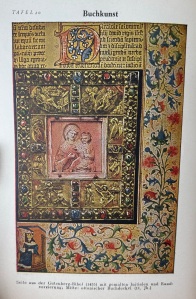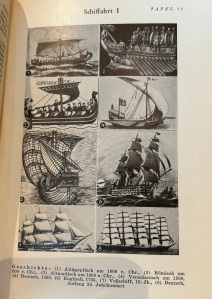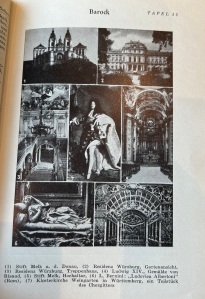What is a Lexicon and why is it important?
Traditionally, a lexicon has contained the vocabulary of a person, language, or branch of knowledge; it is typically an abstract notion in contrast to a literal dictionary or encyclopedia. In my Composition courses, I ask students to consider their “lexicon” as an important part of their voice. This includes vocabulary that has been imprinted into their memory from literature, conversations, movies, speeches, print, etc, throughout their young lives.
I recently found a Lexikon in a give-a-way box behind St. Stephens church. Lexikon which was published in Vienna, possibly in the early 1950’s (according to the content, Eisenhower was still President) and provides a linguistic, philosophical, and historic purpose for this “knowledge”. The Lizenzausgabe der Deutschen Buch-Gemeinschaft Wien (The German Book Association of Vienna) published this Lexikon to provide “an overview of the past and present, of the old and the new, of the knowledge of humanity, in short” (Lexikon, Vorwort)–An abstract notion in the German culture.
In the Vorwort (Forward), the editors state that “in the whirlwind of time, in the pace of progress, and research, there has been a brief standstill, a breathing space that serves the purpose of review, order, and self-determination…the right moment for the revision of our Lexikon” (Vorwort). The “whirlwind of time” must include the atrocities of the previous two decades of World War II, German occupation, and rebuilding of the Austrian culture and way of life. The “knowledge of humanity” must include what this DBG Book Association viewed as the most important information in the world, at that time, that will be documented in a “short, concise, and sharply formulated key words”.
This Lexikon, therefore, became a compulsory souvenir to bring home from our trip to Vienna. What better way to be enriched by the culture of our beautiful city on the Danube.
How does one compile the important “knowledge of humanity” out of all the civilizations of the world in just 1103 pages? I want to work for a Book association that is given this task! What information would you omit? How far back into the “past” do you go? The Garden of Eden made it!

As stated in the description, the DBG Lexikon has short, concise key words by every entry. Unlike phrases or definitions, one would find in a dictionary, the structure contains the entry, country of origin, and a few facts. For example, here are a few entries:
- Bon jour, frz., guten Tag
- Einstein, Albert, ber. Physiker 1879-1955, begründete die (s.) Relativitätstheorie, erweit. Die (s.) Quantentheorie; 1950 Veröffentlichung der Allgem. Nobelpreis 1921.[ renowned physicist, founded the theory of relativity, expanded the quantum theory; 1950 publication of the General gravitational theory. Nobel Prize]
- Mozart, Wolfgang Amadeus, bed. Öst. Musiker 1756-71; schon als Kind ber. Pianist u. Komponist, unter Aufsicht seins Vaters, Leopold, Kunstreisen durch fast alle europ…[Already as a child, he was a pianist and composer, under the supervision of his father, Leopole, art trips through almost all European capitals.] I abbreviated this entry as it was quite long!
- Plutonium, Abk. Pu, kunstl. Element Atomgew. 238 u. 239, Ordn.ZI. 94.
- Sing-Sing, New Yorker Staatsgefägnis. (how did this make it in?)
- Ft. Worth, Texas (but not my hometown of Dallas? Come on)
- Utope, griech., Nirgensland, bennant nach Thomas Morus; unverwirklichbare Idee, Illusion (description of an Ideal state, translated.

I’ve come to the conclusion that this Lexikon is similar to what we consider today as “cultural, relevant”; the “who, what, where, when” of Pop Culture. The “Influencers”.
As I was contemplating what and who I would include in my World Lexicon, I looked to see if the DBG had similar ideas: the “old and new, past and present, the knowledge of humanity” (up to 1959). Most of the entries that I would include in my Lexicon were found in DBG, surprisingly:
Astronomy, Geology, Paris, Balzac, Hugo, Verne, Renoir, Van Gogh, Monet, Dürer, New York, Longfellow, Goethe, Milwaukee (but there’s no Chicago??), Plato, Ovid, Homer, Shakespeare, Melville, Bruges, Vermeer, Sorbonne, Latin Quarter, Whales, ]
and here are a few that I would add to their list: C.S. Lewis, Jean Calvin, Jules Verne, Oswald Chambers, William Barclay, [basically the categories and tags on my frenchquest blog!!!]
One of the highlights of this Lexikon is the 100+ colored illustrations included throughout.

As far as I could tell, the entries include most of the major countries and civilizations in the seven continents. So fun. It is interesting to look at the maps of the world in the 1950’s since there have been so many changes. In the Forward, the editor, Sebastion Lux of Munich, stated that this was a Revision. I wish there was a way to compare this to the older edition. Were only new entries added? Did any of the former entries change? Hitler’s? Rußland? Amerika?
I love my new treasure and I’m thankful to the generous erudite who shared it!
Work Cited
DBG-Lexikon (year unknown). Sebastian Lux of Munich, Editor. Lizenzausgabe der Deutschen Buch-Gemeinschaft Wien Publisher.

what a delight!…thank you…will have to make my own…well, I love the idea of making my own…but will I?..
I am so glad to hear from you, jimmeryman, and that you are thinking intently on this subject. Please keep me updated on your journey! Robyn
Fascinating post. I’d have to include these words in any modern lexicon:
Dataquake
;Algomancy
;Cyberflux
;Glitchcraft
;Neuralize
;Infoburst
;Synapscape
;Bytegeist
;Codewraith
;Virtuosity
;Memeplex
;Nexustech
;Quantumshift
; Pixelstorm
; Holoform
Hi Chuckster, I appreciate your list for a modern lexicon. These entries are mostly new to me (I recognize Virtuosity)! This is fascinating. I hope you will blog about your lexicon so I can learn more…Robyn
Robyn, what an incredible and unique find! Thank you for sharing, I enjoyed learning about it, the wondrous images and good additions of your own that you’d add!
Thank you Annika, I can’t put my new Lexikon down. I refer to it daily and I’m learning so much about other cultures. I even asked my family on a recent vacation to write 20 words that they would add to their personal Lexicon! I appreciate your nice comments. Robyn
Beautiful post well shared 👏 keep going on with your passion ☺️
Yes, the preservation of our natural resources is imperative. This is why our future generations must embrace these landmarks! Thanks for commenting.
You are welcome 🤗